The winner of the FIDE Candidates Tournament answered Eteri Kublashvili’s questions in great detail. We publish this interview, courtesy of the official website of the Chess Federation of Russia, with some minor edits. The video version is available here.
– Ian, you won one of the most important events in every chess player’s career and qualified for the World Championship Match. It’s a great achievement, congratulations! So, how do you feel now?
– Thank you. I feel really exhausted because it was an incredible tournament in many, many senses of the word. First of all, I guess it took 400 days from start to finish, it is kind of outstanding. Well, when you read about chess history, players were travelling by sea, from America to Europe and so on… In our times, you know, it’s not romantic at all because of the global pandemic thing.
I think the most difficult part was not playing chess, but these 13 months between the first and second legs, during which one somehow needed to keep one’s focus, needed to prepare constantly thinking about other guys: what were they doing, how did they prepare, what were they going to play, because basically, it’s one year between the tournaments and only seven games to prepare for. So, you should be ready that you’re going to face completely different players in a completely different situation.
I believe, for instance, Ding played really poorly in the first leg, scoring –2, and now, in the second leg, he scored +2. He also beat me on the last day. It’s just one of the examples.
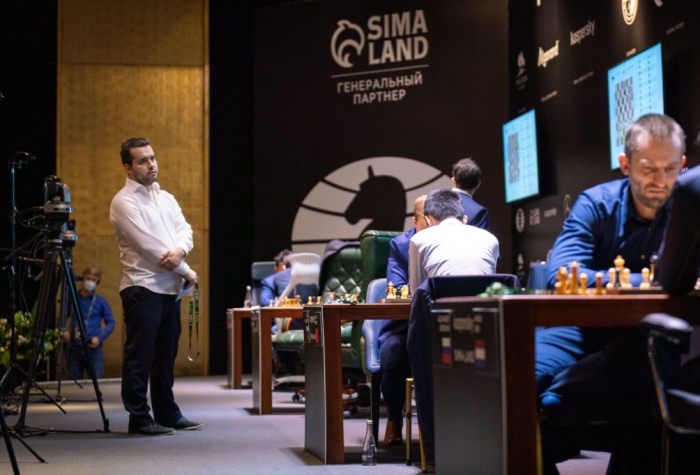
– Yes, it was a very long and nervous period of expectation and negotiations, but still, in one of his interviews, Anatoly Karpov said that this one-year break would do you good because probably you would save more energy for the second part. Do you agree with this?
– Well, especially now when I know the result – yes. Indeed, I’m not the person who should whine about this long break, since in the end, I won the whole thing. However, I’d say that this also would help other guys, because, you know, the Candidates Tournament is a very difficult competition, the stakes are very high, and there’s only one place, so it doesn’t matter if you finish on +1, or +2, or earn some rating: you should score the maximum amount of points, you should take the first place. Basically, you can earn some rating, you can play some good games, but all this will never make you happy unless you win the Candidates.
If you remember the last year, everyone was afraid of the COVID-19. As for me, on my last training session before the tournament, I got a slight cold, but somehow it was going worse and worse and worse, and by the end of the tournament, I was feeling really bad. As far as I remember, in the last game of the first leg against Maxime, I actually skipped most of my preparation because I was feeling so bad that I just wanted to save as much energy as I could, but it produced the opposite effect. I just mixed up moves in the line that happened and quickly got a worse, almost lost position. After that game, the situation wasn’t that clear anymore. I was on a +3 score, in a commanding position, but then I ended up sharing first place on +2 with Vachier-Lagrave, and it was very bad news for me.
Anyway, I was determined to show that this was just a random slump, and I was preparing hard for my next game against Anish… I was very shocked and disappointed when I learned that the tournament was stopped to be resumed “sometime in the future”. Then some time passed, and I understood that I was very far from my best conditions, so I guess this [stopping and resumption] made me a really big favourite.
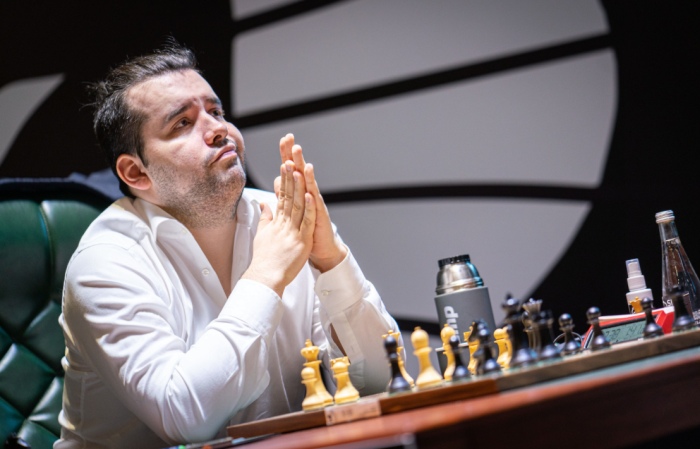
– What was your strategy before the second part?
– The strategy was quite simple: not to lose (laughs). Because, well, it may sound funny, but in general, I had an opportunity to commentate on two last editions of the FIDE Candidates Tournament. In Moscow 2016, we commentated with Miroshnichenko, and it was only for one half of the tournament. I think I was also helping Svidler a little bit during the event but wasn’t really involved in it. In 2018, I covered the tournament fully on my Twitch channel. And I noticed that people were just going completely crazy for some reason. Perhaps the stakes are so high that they can’t help it… The smaller problem is they can’t play their best chess. They are affected by the strength of their opponents, their good preparation, and the pressure. But it goes without saying that the bigger problem is that sometimes you’re just going completely crazy, you play some moves or make some decisions you’d never make in any other circumstances. It was a big lesson for me, especially commentating on Kramnik’s games. I guess he’d played six or seven decisive games: win-loss, win-loss, win-loss… Well, OK, win and loss are the same as two draws, but they don’t bring you closer to the first place.
At some point, I realized that as far as I scored +2, I was kind of lucky because the games against Wang Hao and Ding Liren at the start of the tournament went really well for me, I got something I prepared for, and I managed to convert, of course, not as smoothly as I wanted, but still. And I thought, all right, I have four White games in the second part of the tournament, while Maxime has four Blakc games. I feel that MVL is more a “white” player, he does want to push with White, it’s one of his strengths. On the other hand, his repertoire with Black is a little bit risky for such a tournament. I mean, people had one year to prepare… Last year, it wasn’t such a big problem for him because no one prepared for Maxime. Everyone was getting ready for Teimour Radjabov, so they analyzed, say, the Berlin Defence or the Queen’s Gambit. At the end of the day, Vachier-Lagrave is a completely different player with a completely different style and openings, he came as a replacement, so no one was ready to pose problems for him, and I guess this helped him a lot last year. Usually, any last-minute replacement is always like a dark horse that can win the whole thing. This FIDE Candidates was quite a case of that.
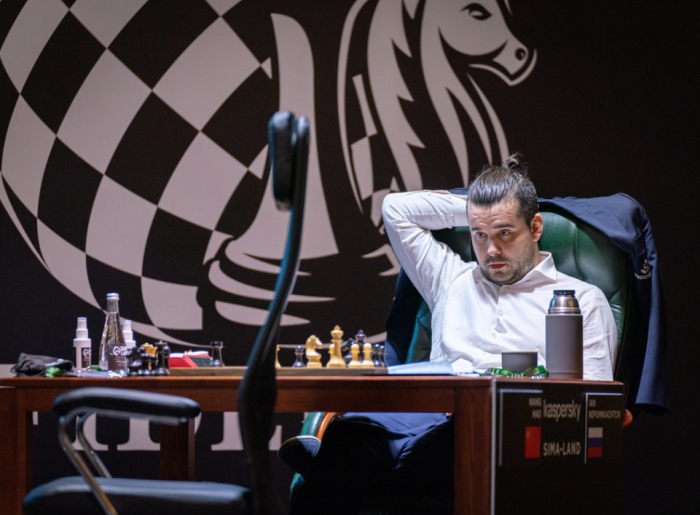
In general, I felt that I’d have some chances – I had four White games, and, of course, it’s better to play with White than with Black. I prepared a lot, but, weirdly enough, I could never show any of my preparation during this tournament. It was really frustrating seeing other guys playing my ideas in some rapid events. Two weeks before the tournament, there was the European Online Club Cup, and at some point, I just threw my iPhone into the wall because I just saw a guy playing the line that I’d prepared very well for the tournament. I was completely crazy at that moment; I was just so mad. He lost his game, but, well, now it wasn’t the line I could surprise anyone with.
So, in a nutshell, I think the key was to keep cool, be chill, play some good chess and try not to be affected by emotions.
– So, please tell us a bit about the course of events in the second half. What was a turning point? Which game in your opinion was be the best one for you?
– Well, I started with White against Anish, and you know that thing called the Murphy’s Law, “What can happen will happen” (laughs). Actually, as I prepared for this game, I literally thought, OK, he might play Sicilian, he might go for c5, or e5, or even some other lines, and I thought that the last line he could go for was Sveshnikov. I had a good idea for Sveshnikov, but I didn’t brush it up at all. And then I faced Sveshnikov. I was very angry with myself, so I just made some random moves, got a decent position and just repeated it because I thought, well, it’s not the position I was aiming for.
Also, I’d like to add that in general, somehow I had a feeling that Fabiano and Anish would be in some way a more serious threat than Maxime for me, since the latter had four games with Black, and this might be tough for him despite having a whole year to prepare. It would be hard for him to defend with Black because he’s a very active player and he’s not that good at defending. Probably that’s why I tried to be more solid against Anish and Fabiano. Once again, as I mentioned before, the key was not to lose. Even half a point is still a small step forward, and you’re taking half a point from your potential opponent as well.
In the game against Sasha [Grischuk], I think I was defending for the whole game, he was trying to spice things up a little bit at the end, but I refused to take his exchange sacrifice and just accepted a draw instead. He was very annoyed with my decision but that’s okay.
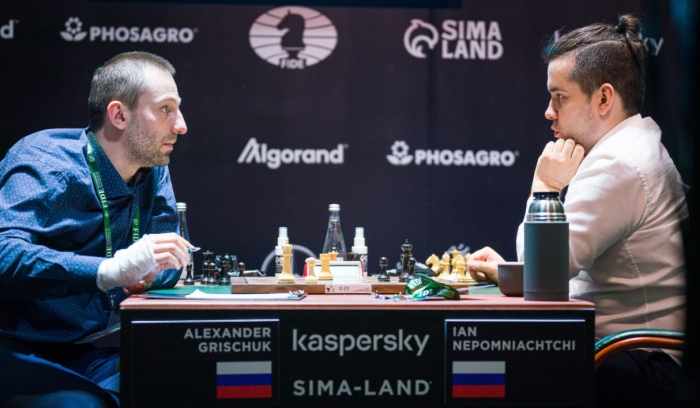
Then there was the game against Kirill, which I thought was one of my chances, because in general, I had quite some time to prepare, first of all. Kirill had no chance to play anywhere during the last year, and also, unlike other participants, he surely lacks some experience. Maybe his knowledge is not as wide, and you can confuse him a bit in the opening, which actually happened in our game. I think he suddenly got into trouble after 8 or 9 moves in not such a well-known line. Of course, it’s well-known for the guys who play it, but in general, this Semi-Catalan without the d4-move can be tricky if you face it for the first time, and that’s what happened. I guess this was a very lucky moment for me – I won this game more or less without a big fight because Kirill proved himself to be a very fierce fighter: he won against Grischuk, he beat Anish in the last round, and I guess he could also beat Ding in the penultimate round. He had a very promising position and then just blundered away the game at some point.
So, after this, I got +3, and I felt that it was going the right way. I didn’t want to spoil it, so I just stick to my strategy. Maybe it’s very boring; I don’t like playing such chess, you know, when you don’t really care about what’s going on in the game. You just try to be solid, try not to make mistakes. This is not very usual stuff from me. I prefer some excitement, some…
– Active play?
– Yes, let’s say, active play, creative play… In the last round, I was sort of creative, and we all know where it led me to (laughs).
I guess this was the first turning point, the game against Wang Hao. At that point, he’d only lost against Anish, so it wasn’t clear yet that this was possibly the worst event of his life, which we could see if we check his last two games. It’s like a nightmare. I really feel sorry for him.
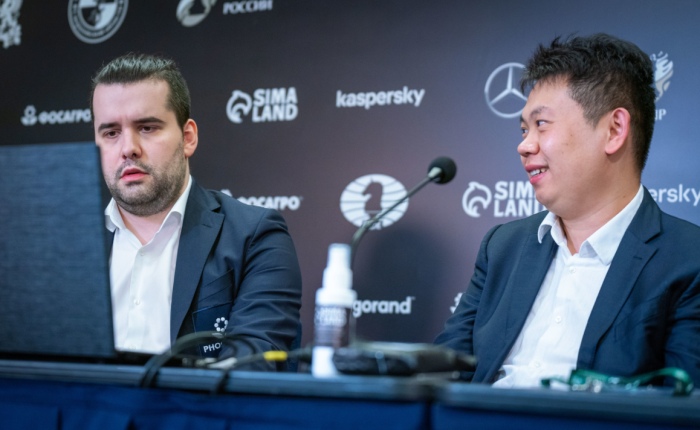
– He’s going to quit chess.
– Yes, as far as I know, he said he was going to quit chess. He said something like this to me after our game as well. I’ve never really hoped to win with Black against him, especially considering my opening choice, the Petrov’s Defence. It was a very important game, a turning point.
But I also must mention the game between Fabiano and Anish. At some point, Fabiano, a player of such a caliber, started making moves like 21.c3 and 22.Rc1 just not to allow draw – this is very familiar to me. It’s not even that you’re playing a game that you should win at all costs. However, it was still very familiar to me because, especially previously, when I played against an opponent who was, in my opinion, weaker than me, not a strong GM, or something, I started making moves that didn’t let the opponent trade pieces, then I got a poor position and ended up losing. Maybe it stems from childhood, the junior tournaments. So it was very familiar to me.
Of course, I was very stressed because Anish was just half a point behind me. By the way, at one moment, he technically was the leader of the tournament while my game with Wang Hao was still on. And, of course, I was really happy that I managed to convert it because the position was tricky, and my opponent clearly wasn’t in the mood to defend patiently. So, scoring +4 was indeed sort of a turning point. Still, it’s funny that the fact that Anish was a half a point behind me, helped me a lot with my mental focus on the game against Vachier-Lagrave because under other circumstances, I would have probably gone for some silly line trying to make a draw. No one knows how the game would turn out, but there I actually wanted to win it and only changed my course when I saw Sasha really pressing against Anish.
Basically, it took me six rounds to win the whole thing, but it was indeed a very, very stressful week for me.
– Having won the event with a round to spare, you said that you had worked with Vladimir Potkin, Nikita Vitiugov, Ildar Khairullin, and you also mentioned Peter Leko. That was quite a surprise for the chess fans. What did you get from this cooperation and what did you expect from it?
– I think I got even more than I had expected since the result is so great. But somehow, I always felt that one of my big drawbacks was the general lack of chess culture.
Let’s start with Ildar. He was born in 1990, the same generation as me, Magnus, Karjakin, MVL, Andreikin and so on, and I guess he’s one of the most talented players of our age, although he didn’t make a brilliant career because, perhaps, of stamina problems or health issues. However, he has a really great understanding of chess; he’s outstanding in analysing positions.
Nikita is mostly my sparring partner. Historically, I have a very poor score against Nikita and Ildar. I’ve never beaten Ildar in a classical game. We haven’t played much after our childhood, but if you want to talk about “Kryptonite”, he’s this for me, sort of. And Nikita is the sort of the player who used to beat me quite often, so it was very instructive to play against him.
And Peter is just a chess legend. At some point, he was very, very close to beating Kramnik in their match in Brissago. I think that the last game of that match was heart-breaking because Kramnik managed to strike back and make the score equal. Leko understands chess really, really deeply, you can take an amazing amount of knowledge from him, and this is a chance you should be a big fool not to use.
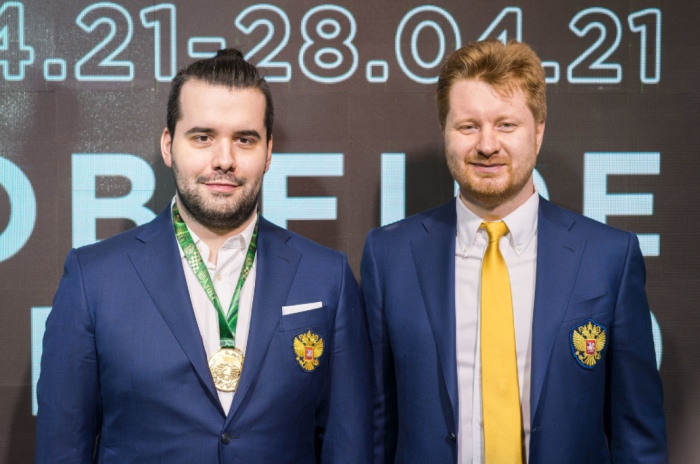
Ian with his long-time second Vladimir Potkin
– During the event, did you read any news or chess analyses about yourself?
– Well, of course, I was trying to minimise my social networking, but, you know, we don’t exist in a vacuum, at least me. So, naturally, I was reading some tweets, some comments and so on, but I was trying not to spend 24 hours a day on this, slightly less.
I think we discussed this once with Levon Aronian, and he said that it was vital for him, for example. He sees himself as an actor who goes up on stage, and it’s very important what the audience says about him. This also affects me in some way, it’s very important. Maybe sometimes it’s even more instructive to read hateful comments, like “This guy resigns without a fight, what is this, these Russians support someone against someone”, and so on, and so on. And also, of course, many thanks to the people who sent me supportive messages during the tournament. It’s really important to understand that you’re not playing only for yourself, that you’re playing for some people and you’re also trying not to fail them. Yes, it’s not only about playing for yourself, but it’s also something else: playing for your country, for chess fans… This may sound too lofty, but, you know, it is important for me as well to play for my compatriots out of patriotic feelings.
– There were many talks about the tiebreak criteria here. Do you think they are just and right? Don’t you feel that there should be a play-off match between those who tie for the first place?
– Well, this is surely up for discussion, so many thanks to Kirill, who won in the last round, so that in this particular edition of the FIDE Candidates I got the clear first place despite the loss in the last round. However, in general, it seems like the fairest thing to me. I’d played a lot of round-robin tournaments, and there were tie-breaks to determine first place. For example, three or four people can share first place in an open tournament. Somewhere, like in Gibraltar, you play tie-breaks. Somewhere, like in the Grand Swiss, you just calculate rating performance, or Buchholz, or direct encounter.
So, technically… I guess FIDE also considered – I’m not sure if so, but I think it was possible to finish the tournament after only one half. Everyone played against everyone, and so Maxime would have qualified because he won the direct encounter against me. Once we start, once we sign the contract, we all, technically, mentally maybe not, but technically we all agree with what’s going on, with the rules. The situation is equal for everyone.
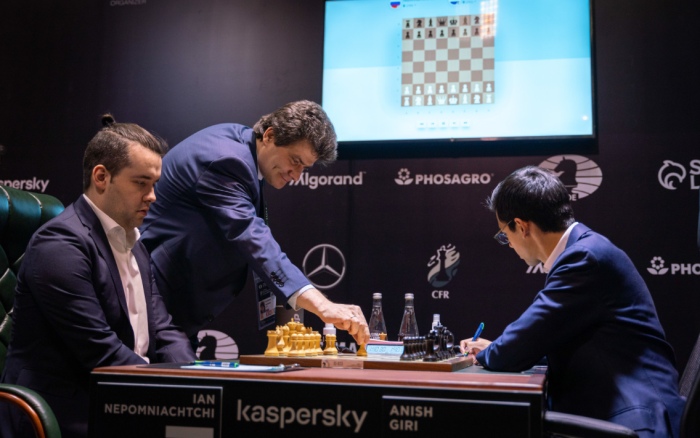
Speaking of Anish and me – you know, I think it was Kasparov who said that because of a win one year ago, it was now unacceptable for Anish to share the first place with me since he would lose on tie-break. But I think he also said after that: “Let’s consider the opposite situation where if Ian shares the first place with MVL, then Maxime wins because of the tie-break”. So this applies equally to everyone. I see nothing wrong with an extra match, for example, in case of finishing on equal points, or maybe, I don’t know, we can discuss some other options, but this system… I think it has been consistent for seven or eight years.
London 2013 was quite interesting because Kramnik had Black against Ivanchuk in the last round. He played the Pirc Defence because he wanted to win and he was sure that Carlsen would never lose with White against Peter Svidler. And they both ended up losing: Carlsen to Svidler and Kramnik to Chucky. And then, because of the tie-breaker, I think it was Berger, Carlsen qualified for the Match and then became the World Champion. So, you know, we should have started these talks at that time. I think back then, there were also lots of discussions, so I guess this is more a question to the FIDE authorities. Once again, when we all start, we’re all in an equal situation, and it’s the game of chess that decides who qualifies and who waits for the next chance.
– And now you have qualified for the Match against Magnus Carlsen, so please tell us about your relationships with him, both over and off the board.
– I think we first played in the European U12 Championship in Spain in 2002, and back then, it was just another game for me – you know, some guy from Norway, which was not such a chess country. I didn’t think much about the game – OK, he played well, but then he just collapsed, and I won.
Then I suddenly played against him again in the World Youth Championship the same year, and I think we ended up sharing first place, and I won the tournament due to tie-breaks. We also clashed a couple of times in the youth championships, but soon after, he stopped playing in them. It was probably his best decision (laughs) to stop playing in the youth championships. You know, normally when a young player shows good results in his/her age group, experienced coaches always say that one should stop playing opponents of one’s age and start playing against adults, against strong opposition. Yes, one may start losing, but anyway, it’s much more useful for one’s chess career, for improving one’s play.
So, I guess we’ve known each other for almost twenty years. At some point, I think in 2010 or 2012, we used to work a little together; there were some training sessions. Once, I think, I was even second to Magnus in some London tournament in 2012 (I might be mistaken). He has a nice personality, he’s a very nice dude. I can’t say we’re close friends, but I think we have quite a nice relationship. Still, as you know, you can have no friends over the board, and I think we were never friendly to each other when we were playing chess, and especially now, when you think about the match, you probably should…
– Forget your past?
– It’s not even about forgetting the past or thinking of the future. Now, it’s a rivalry, an undeclared war (laughs), so the situation has changed a bit.
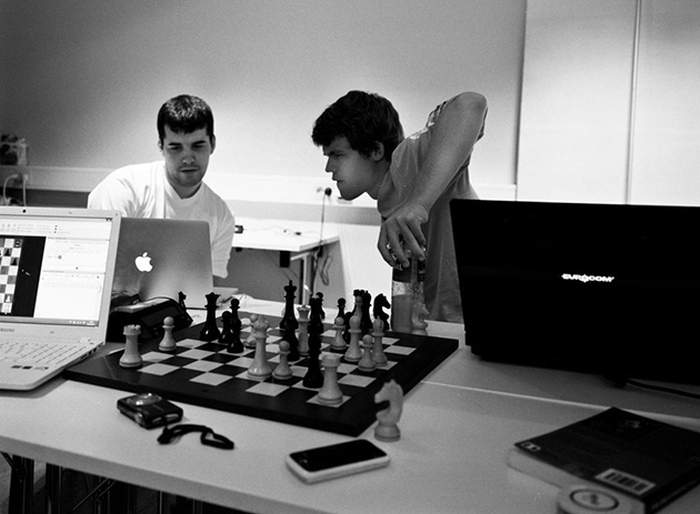 Ian and Magnus in 2013. Photo by Misha Friedman
Ian and Magnus in 2013. Photo by Misha Friedman
– Recent World Championship Matches saw too many draws, and they were decided on a tiebreaker. So, what do you expect from your match? Is it going to be more bloody?
– Once again, I should remind you that I didn’t only commentate on the Candidates Tournament, but also commentated on the last match between Fabiano and Magnus. At some point, I was saying to the viewers, “Okay, guys, but today there’s no way it’s going to be a draw, look, the position is so complex, even theoretically it’s not going to happen – the seventh draw in a row, the ninth draw in a row…” In the last round, Magnus had a very nice position, but he decided to go to the tie-break, he made a draw in a position that I thought was nearly winning for him. So, never say never. I don’t know what to expect. First of all, I expect myself to prepare well and play well, and I don’t think I should care a lot about the rest.
– Let’s deviate from chess. What did this severe year of the pandemic teach you?
– I don’t think that it actually taught me anything. Perhaps, patience? I used to be very busy with chess in two previous years, 2018 and 2019. 2019 especially was a madness: I decided to combine the Grand Chess Tour, the Grand Prix series, the World Cup, in the Fischer random championship, and something else, perhaps. It started in May and lasted until the very end of the year. I never really had a chance to rest; it was like two weeks at some point. It was a nightmare, I was completely exhausted by the end of the year, and I guess it was a miracle that I qualified for the Candidates through the Grand Prix because it was very long.
My favourite parts, of course, were in between the tournaments, when I came home and didn’t even unpack my luggage. I just laid on the sofa watching movies, playing some games, and just chilling. And then suddenly I got almost a whole year of such life. Clearly, for the first couple of months, I was just completely enjoying it, playing all sorts of computer games, feeding off my nostalgia feeling, and so on, but at some point, I understood that I was rather bored. I couldn’t meet my friends, go to tournaments… I was more or less busy with these online events, but they are quite different, so it took me some time to focus on them. Probably, the toughest part was to remain patient and slowly prepare for the next leg of the Candidates Tournament. I’m not sure whether it actually taught me anything, but the previous year was really challenging.
I guess I improved my chess a lot because I had a lot of training sessions, analysed a lot of positions, learning a lot of new things, and it was very important. So if you compare me today with me, say, one year ago, I guess I made a huge step forward, chess-wise. I’m not sure if it’s really obvious in my play, but it is in my, let’s say, inner feeling.
Speaking about other aspects of life, I can’t say I learned anything. OK, we got a doggo (laughs), so it was probably the biggest change of the year.
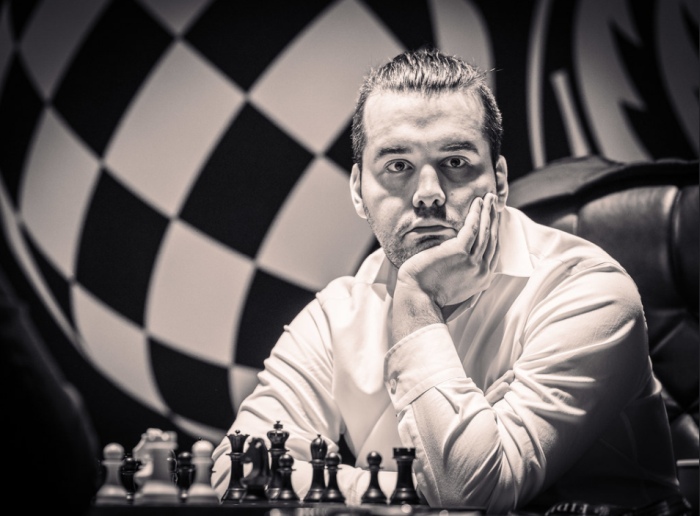
– Speaking about online chess. Now that you’re going to play the World Championship Match, will you reduce the number of online events you’re taking part in?
– That’s a good question. I’m not so sure if it really affects me because I should say I never took it too seriously. For example, Fabiano just stopped playing online at some point, and I think he didn’t take part in the next series of the Champions Tour or something. He just completely stopped any online activity. Maybe he played a couple of Titled Tuesdays, but I’m not sure about this. And somehow, it was also a major question for me if I was going to play in this final event of the series, but I just checked the calendar, and I thought “OK, well, there’s one month, and anyway, I need some practice”.
So, I could, for example, play a training match against Nikita, but it wouldn’t be as competitive as fighting against the finest players. In the end, I thought that probably one month was enough to have a rest, so I was planning to play for three-five days, then get knocked out to get practice and don’t grow too tired. However, it went by the second-worst scenario. The worst scenario was playing the match for third place and lose, and the second-worst was playing the finals and lose. I didn’t win the event at the end and grew very tired. I had my final and very important training session right after this tournament, and on the first couple of days, I was just completely procrastinating and didn’t do anything. I was watching guys studying some chess, analysing positions and saying, “OK, guys, very nice, very nice, I’m going for a walk, keep up the good work.”
The problem is that the current format is probably too hard for players. I guess we all want some drama and excitement, a lot of games, twists and turns, and so on, but playing for nine days, without a break in the current format is too much, I guess. That’s why I’ll think twice if I’m going to play more. I assume I have some chances to qualify for the final of this tour, which is going to be held in the USA, but at the moment, I’m not sure if I really need this. I guess it’s vital in life to focus on things that really matter, and with all due respect for this huge chess boom we have online, also thanks to these tournaments, I can’t say that it matters to me anywhere near classical chess and especially the World Championship cycle.
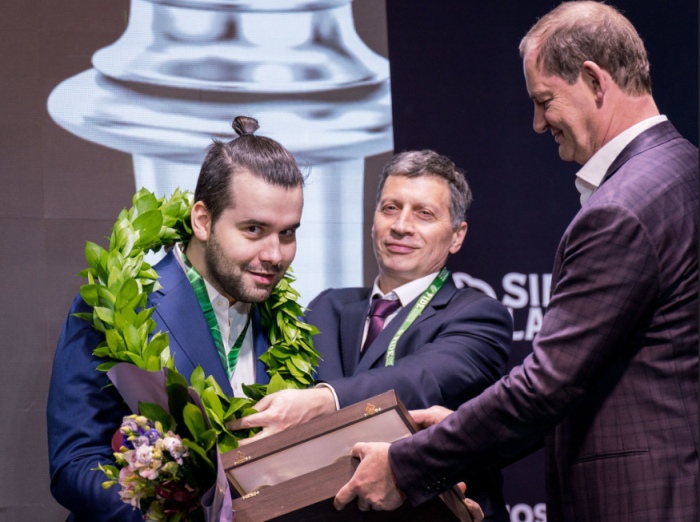
– How are you going to celebrate the victory in the Candidates Tournament?
– Surely, first of all, I’ll get some good rest. The night before the last round was the first night in the last two or three weeks when I slept really well, without any extra thoughts, like “Am I going to…”. It was very difficult mentally since you understood that if you didn’t win the Candidates, this tremendous amount of work was going into the blue. I mean, you can use your novelties in the next tournament, you can earn some rating points, you can play a few good games, but it’s all very, very different once you have the goal, and when you miss it, it’s just a very sad story. So, when I secured the victory, it was the first time I slept well in the night – maybe it’s somehow related to my poor game in the last round (laughs)?
When I come to Moscow, I’ll probably have a small party with my close friends, but I don’t think I have enough time to celebrate. I don’t have a whole year before the next event; it’s only half a year. I guess when you say “half a year”, you think “Wow, it’s quite some time”, there’s enough time to train. However, frankly speaking, we got the experience of having one year of preparation for seven games and ending up with “OK, but we didn’t see this, this, this and this” and “Come on, how could we play like this, how could we prepare that badly?” Anyway, you have this feeling, and it means that there’s never enough time to prepare. Now, there’s half a year to get ready for the World Championship Match, and I’ll have two years of preparation for the next one (laughs). For this one, I think I’m already in time trouble. So I guess there’s really not enough time to celebrate and to have a rest. I think it’ll be very smooth, and then I’ll start to prepare, prepare and prepare again.
– Ian, thank you and good luck!
– Thank you.

